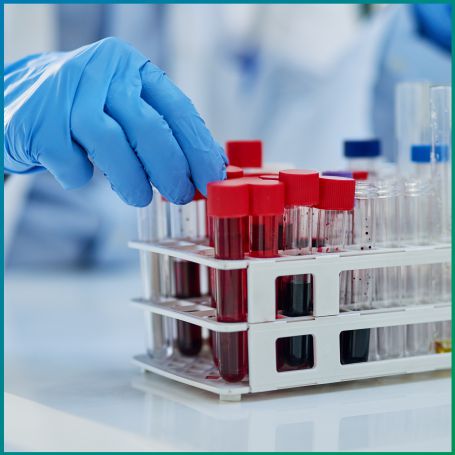
The Anti-Phospholipid IgG Test is a blood test used to detect antibodies against phospholipids, a type of fat molecule found in the cells' membranes.


These antibodies are part of the body’s immune system and are typically produced in response to an infection or injury. However, in some cases, the immune system mistakenly targets these phospholipids, leading to a condition known as antiphospholipid syndrome (APS). This can cause an increased risk of blood clot formation, leading to serious health complications such as strokes, deep vein thrombosis (DVT), and miscarriage. The Anti-Phospholipid IgG Test specifically measures the IgG subtype of these antibodies, which are considered to be the most strongly associated with APS.
The Anti-Phospholipid IgG Test is important for diagnosing antiphospholipid syndrome (APS), a condition that can lead to recurrent pregnancy loss, blood clots, and stroke. APS may occur alone (primary APS) or alongside other autoimmune diseases like lupus (secondary APS).
The test is particularly relevant when a patient has a history of:
1] Unexplained blood clots (deep vein thrombosis or pulmonary embolism)
2] Recurrent miscarriages or complications during pregnancy, such as pre-eclampsia or stillbirth
3] Stroke or other thrombotic events in younger individuals (under 50)
A positive result for anti-phospholipid IgG antibodies in the blood may indicate that a person is at an increased risk for these complications. However, having these antibodies alone does not necessarily mean a person will develop APS or experience blood clots. Additional testing, such as measuring lupus anticoagulant or anti-cardiolipin antibodies, and an assessment of clinical symptoms is often required for a complete diagnosis.
The Anti-Phospholipid IgG Test involves a simple blood draw. A healthcare provider will collect a blood sample from a vein in your arm. This sample is then sent to a laboratory where it is analyzed to detect the presence and levels of IgG antibodies against phospholipids.
The test is usually done in conjunction with other tests for anti-phospholipid antibodies, such as the Anti-Cardiolipin IgG/IgM Test and Lupus Anticoagulant Test. The results are typically given as a titer, which indicates the concentration of antibodies present in the blood.
1] Positive Result - A positive result for anti-phospholipid IgG antibodies indicates that the immune system has produced antibodies against phospholipids. However, a single positive test is not enough to diagnose APS. The diagnosis of APS requires two positive tests, at least 12 weeks apart, in conjunction with clinical symptoms such as blood clots or pregnancy-related issues.
A high titer of anti-phospholipid IgG antibodies suggests a higher risk of developing blood clots, while a low titer may not be clinically significant. In some cases, positive results may be seen without any clinical symptoms of APS, especially in individuals with other autoimmune diseases like lupus.
2] Negative Result - A negative result means no significant levels of anti-phospholipid IgG antibodies were found in your blood. This reduces the likelihood of APS, but it does not completely rule it out. Some people with APS may have negative results for anti-phospholipid antibodies, especially if testing is done too early or if the antibodies are present at low levels. If clinical symptoms suggest APS, further tests and monitoring may be recommended.
You should choose Diagnopein for your ANTI PHOSPHOLIPID IgG test because we are committed to providing high-quality diagnostic care in a clean and hygienic environment. Our center is equipped with advanced technology to ensure accurate and reliable test results, which are crucial for assessing this test. Diagnopein’s experienced staff is dedicated to handling tests with precision and care, offering you both expertise and comfort. We also offer affordable pricing, making essential health diagnostics accessible without compromising quality. For timely, professional, and affordable cardiac testing, Diagnopein is your trusted partner for your healthcare.
Yes, certain medications can influence test results. For example, medications such as hydralazine or procainamide can induce the production of anti-phospholipid antibodies, potentially leading to false-positive results. Be sure to inform your healthcare provider about any medications you're taking before the test.
The Anti-Phospholipid IgG Test is a routine blood test, and the risks are minimal. There may be some temporary discomfort at the site where the blood is drawn, including bruising or slight pain. Serious complications are rare.
The test involves a simple blood draw from a vein in your arm. The sample is then sent to a laboratory where it is analyzed for the presence of anti-phospholipid IgG antibodies.
No, the Anti-Phospholipid IgG Test is one of several tests used to assess APS. A full diagnosis typically requires testing for other antibodies, such as lupus anticoagulant or anti-cardiolipin antibodies, along with the patient’s clinical symptoms (such as blood clots or pregnancy complications).